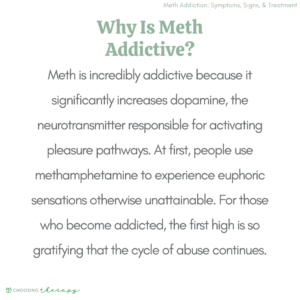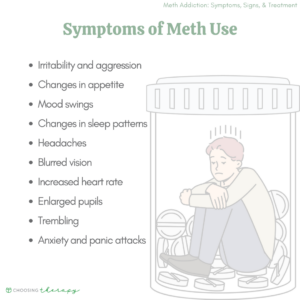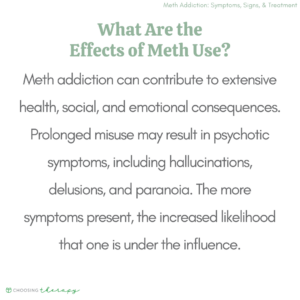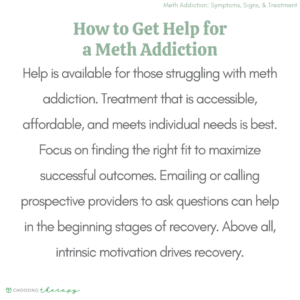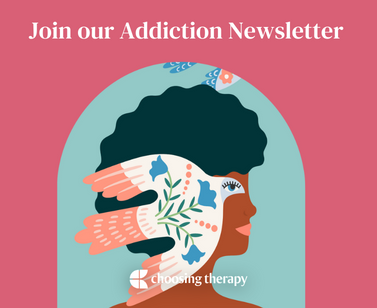Meth addiction is a diagnosable stimulant use disorder in which individuals are physically, mentally, and emotionally reliant on methamphetamine. Signs of methamphetamine use often include increased aggression, intense cravings, and an inability to maintain recovery. Use continues despite a desire to stop or in the face of personal and social consequences.
Bicycle Health: Telehealth Treatment For Opioid Use Disorder “Best For Online MAT Program For Opioid Use Disorder” (Choosing Therapy)* Bicycle Health offers therapy, support, and medication for addiction treatment (MAT). MAT offers the lowest relapse rates for opioid use disorder, helping people to stop using opioids with minimal physical discomfort. Covered by most major insurance. Visit Bicycle Health.
What Is Meth Addiction?
Methamphetamine (meth) addictions develop with increased tolerance to and reliance on meth, resulting in significant impairments, health problems, disabilities, and failures to meet responsibilities. Meth addiction is an ever-increasing problem, with an estimated 964,000 people aged 12 or older reporting a methamphetamine use disorder in 2017.1
Why Is Meth Addictive?
Meth is incredibly addictive because it significantly increases dopamine, the neurotransmitter responsible for activating pleasure pathways. Long-term methamphetamine use may significantly change dopamine systems, possibly resulting in coordination, verbal learning, memory, and emotional impairments.2 At first, people use methamphetamine to experience euphoric sensations otherwise unattainable. For those who become addicted, the first high is so gratifying that the cycle of abuse continues.
According to Dr. Ralph A. Weisheit, a Distinguished Professor of Criminal Justice at Illinois State University, “Meth is a powerful central nervous system stimulant that is not instantly addictive but is, for most who try it, instantly pleasurable. That sense of pleasure includes a feeling that they can do anything. The higher the dose the greater the pleasure, but the worse the depression that follows when the effects wear off. This depression can be countered by taking more meth.”7
Symptoms of Meth Addiction
Often, the symptoms of methamphetamine use are pleasurable immediately after injection or ingestion. Individuals may exhibit various physical and behavioral symptoms, and the euphoric “high” of meth use may last a few hours.2 However, the subsequent comedown from meth abuse is unpleasant, possibly resulting in painful withdrawal symptoms.
Meth addiction symptoms may include:3,4,5,
- Irritability
- Hostility
- Changes in appetite
- Weight loss
- Mood swings
- Insomnia
- Changes in sleep patterns
- Headaches
- Blurred vision
- Increased heart rate and blood pressure
- Enlarged pupils
- Aggressive behavior
- Trembling
- Anxiety and panic attacks
Signs of Meth Addiction
Signs of a meth addiction often include increased hyperactivity, paranoia, or aggression.5 Meth users’ behavior may oscillate quickly depending on whether they are high or sober. While actively using, individuals will likely begin isolating themselves or associating with a new social group.
Signs someone is on meth may include:
- Using meth for longer than intended
- Expressing a persistent desire to regulate or cut down
- Attempts to stop using meth
- Spending significant time and effort to obtain, use, or recover from meth
- Craving or a strong desire to use meth
- Recurrent use that may interfere with fulfilling role obligations
- Persistent or recurrent social or interpersonal problems caused or exacerbated by meth use or side effects
- Reduced or eliminated social, occupational, or recreational activities due to meth use
- Use of meth in physically hazardous situations
- Continued use despite knowledge of its persistent and recurrent negative physical or psychological consequences
What Are the Effects of Meth Use?
Meth addiction and use can contribute to extensive health, social, and emotional consequences. Prolonged misuse may result in psychotic symptoms, including hallucinations, delusions, and paranoia. The more symptoms present, the increased likelihood that one is under the influence.
People who use meth may also experience a methamphetamine-induced disorder, such as anxiety or depression. Unfortunately, co-occurring disorders reinforce the symptomatology of meth addiction, compounding the severity of each.
Weisheit notes, “Addicts can experience serious health and social consequences. Meth speeds up the heart while restricting blood vessels. This can lead to hyperthermia. In extreme cases, paranoia may turn into psychosis that includes auditory and visual hallucinations and feelings of persecution. Paranoia may lead the addict to separate themselves from friends and family who do not use. Meth may magnify any existing violent tendencies. Death from using meth is not common and is most often from suicide as a result of depression as the effects of the drug wear off.”
The long-term physical effects of meth addiction may include:2
- Respiratory issues
- Heart disease
- Liver failure
- Rotting teeth
- Kidney failure
- Malnutrition
- Premature aging
- Birth defects
- Reproductive issues
- Skin infection seizures
- High blood pressure
- Sudden cardiac death
- Impaired cognition
- Memory loss
- Hallucinations
- Paranoia
- Delusions
- Depression
- Anhedonia
- Aggression
- Psychosis
Help For Addiction Ria Health: Effective, Evidence-Based Alcohol Treatment 100% Online Quickly change your relationship to alcohol with our at-home program. On average, Ria Health members reduce their BAC levels by 50% in 3 months in the program. Services are covered by many major health plans. Visit Ria Health Workit Health – Online Treatment for Opioids or Alcohol, Including Medication. Modern, personalized recovery that combines medication, a supportive community, and helpful content. Covered by many insurance plans. Currently available in FL, TX, OH, MI, and NJ. Visit Workit Health Best Drug Addiction Rehab Centers – Find the best local detox or drug rehab center covered by your health insurance. Search by location, condition, insurance, and more. Read reviews. Start Your Search
What Is Meth Withdrawal?
Methamphetamine withdrawal is physically and emotionally painful. The severity of withdrawal symptoms varies depending on the amount of meth used and the duration of use. The onset of withdrawal typically occurs within the first day of abstinence, peaks around seven to 10 days, and lasts roughly two weeks.6
Throughout withdrawal, individuals struggle with cravings, inciting further physical and emotional suffering.6 Many addicted to methamphetamine use the substance merely to avoid these uncomfortable symptoms. This cycle of negative reinforcement makes it challenging to maintain recovery.
Withdrawal symptoms of meth addiction may include:6
- Hopelessness
- Sadness
- Depression
- Muscle weakness
- Decreased appetite
- Fatigue
- Lack of motivation
- Anxiety
- Insomnia despite exhaustion
- Headache from dehydration
- Muscle pain, especially in the jaw from clenching
Treatment for Meth Addiction
Given the severity of meth addiction, a comprehensive recovery effort is often necessary. Treatment may include medical detox, residential treatment, and intensive outpatient (IOP). Methamphetamine addiction is a chronic illness that is treatable but not curable. Intentional and consistent efforts throughout recovery lead to promising results.
Rehab
Rehab for meth addiction generally begins with a medical detox followed by residential treatment. Programs vary, but many stays last 30-90 days. The extent of use and presenting symptoms influence treatment recommendations. Rehab staff closely monitor patients, which restricts accessibility to methamphetamine.
Patients maintain a daily schedule usually composed of group and individual counseling, prosocial activities, psychoeducation, healthy meals, and medication management (as appropriate). There may also be opportunities for family involvement (patient and counselor willing).
Bicycle Health: Telehealth Treatment For Opioid Use Disorder Medically Assisted Treatment For Addiction (MAT) Same Day Prescriptions Often Available 100% Online Covered By Most Major Insurance
Intensive Outpatient Treatment
Intensive outpatient treatment (IOP) is less restrictive than residential. Patients attend therapy part-time and may continue life obligations while focusing on recovery. IOP is generally 10-12 hours per week and sometimes combined with group living (e.g., a halfway house) and support groups. IOP treats individuals with higher levels of functioning by providing appropriate support to keep them accountable.
Support Groups
Support groups, like Narcotics Anonymous (NA), may be attended without formal therapy. However, these programs serve better during the initial stages of recovery as an adjunct to professional treatment. The power of a group is that members form companionship, exchange meaningful stories, hold each other accountable, and share resources. Individuals may become sponsors for other members as they recover from meth addiction.
How to Get Help for a Meth Addiction
Help is available for those struggling with meth addiction. Treatment that is accessible, affordable, and meets individual needs is best. Focus on finding the right fit to maximize successful outcomes. Emailing or calling prospective providers to ask questions can help in the beginning stages of recovery. Above all, intrinsic motivation drives recovery.
Getting help for a loved one with meth addiction follows a similar progression. Outside of specific legal and safety concerns, adults must consent to enroll in treatment. As such, encourage them to attend. With minors, parents and guardians may elect for involuntary commitment but are encouraged to be as supportive as possible throughout the process. If you are ready to start searching for an addiction professional, you can ask your doctor for a referral or use an online therapist directory.
Weisheit encourages, “Anyone with concerns should learn at least the basics about meth, its effects, and treatment. They should also be sure to take care of themselves by joining family support groups. Those groups don’t need to be specific to meth but can relate to addiction in general or to other substances. For example, Al-Anon focuses on alcohol but can be a useful when a meth or stimulant specific program is not available. Knowing what kinds of programs are available can be helpful when the addict is ready to change. It is important to be supportive without being enabling.”
Final Thoughts
Meth addiction is a serious condition that can destroy lives, families, and entire communities. The progression toward addiction is rapid and catastrophic. The most comprehensive treatment is best for overcoming methamphetamine addiction.
To help our readers take the next step in their mental health journey, Choosing Therapy has partnered with leaders in mental health and wellness. Choosing Therapy is compensated for marketing by the companies included below. Online Treatment for Opioids or Alcohol, Including Medication. Workit Health – Modern, personalized recovery that combines medication, a supportive community, and helpful content. Covered by many insurance plans. Currently available in FL, TX, OH, MI, and NJ. Visit Workit Health Alcohol Treatment – Cut Back or Quit Entirely Ria Health – Quickly change your relationship to alcohol with our at-home program. On average, members reduce their BAC levels by 50% in 3 months in the program. Services are covered by many major health plans. Visit Ria Health Drug Addiction Rehab Centers Recovery.com – Find the best local detox or drug rehab center covered by your health insurance. Search by location, condition, insurance, and more. Read reviews. Start Your Search Telehealth Treatment For Opioid Use Disorder Bicycle Health – offers therapy, support, and medication for addiction treatment (MAT). MAT offers the lowest relapse rates for opioid use disorder, helping people to stop using opioids with minimal physical discomfort. Covered by most major insurance. Visit Bicycle Health Drinking Moderation Sunnyside – Want to drink less? Sunnyside helps you ease into mindful drinking at your own pace. Think lifestyle change, not a fad diet. Develop new daily routines, so you maintain your new habits for life. Take a 3 Minute QuizAdditional Resources
For Further Reading
- SAMHSA’s National Helpline: (800) 662-HELP (4357)
- SAMHSA Behavioral Health Treatment Services Locator
- 14 Best Books About Addiction
- Narcotics Anonymous
- MentalHealth.gov
- WeConnect Recovery App Review
Best Online Medication-Assisted Treatment Programs Online medication-assisted treatment programs are fairly new to the telehealth industry, but existing companies are expanding quickly with new programs emerging every day. It’s important to explore your options and understand the level of virtual care available so you can choose the best addiction treatment program for you.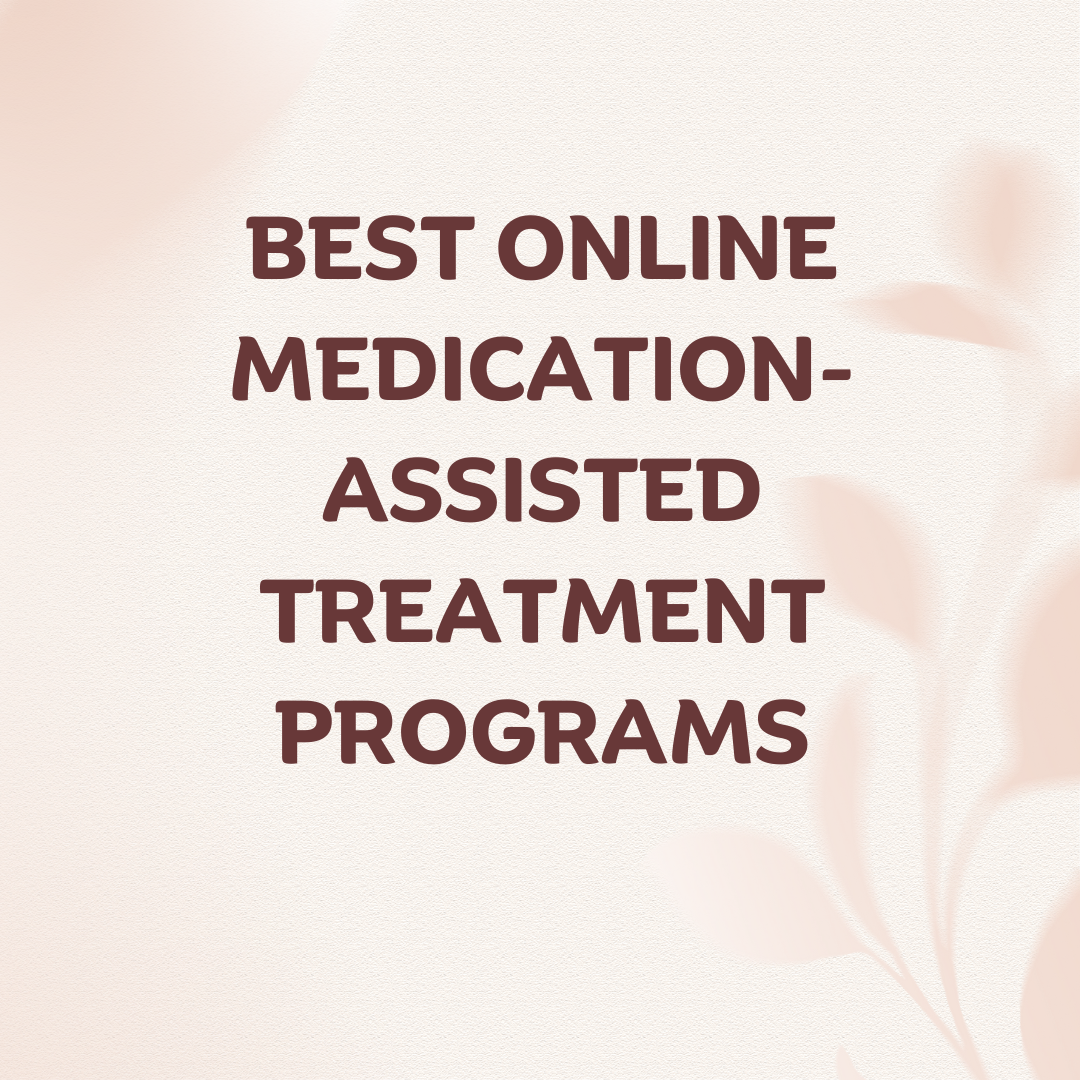
Best Mindful Drinking Apps If you’re thinking about joining the sober curious movement and you’d like to cut back on drinking, mindful drinking apps are a great place to start. Practicing mindful drinking can take some time, attention, and patience, but with the help of the right app, you can completely transform your relationship with alcohol.





